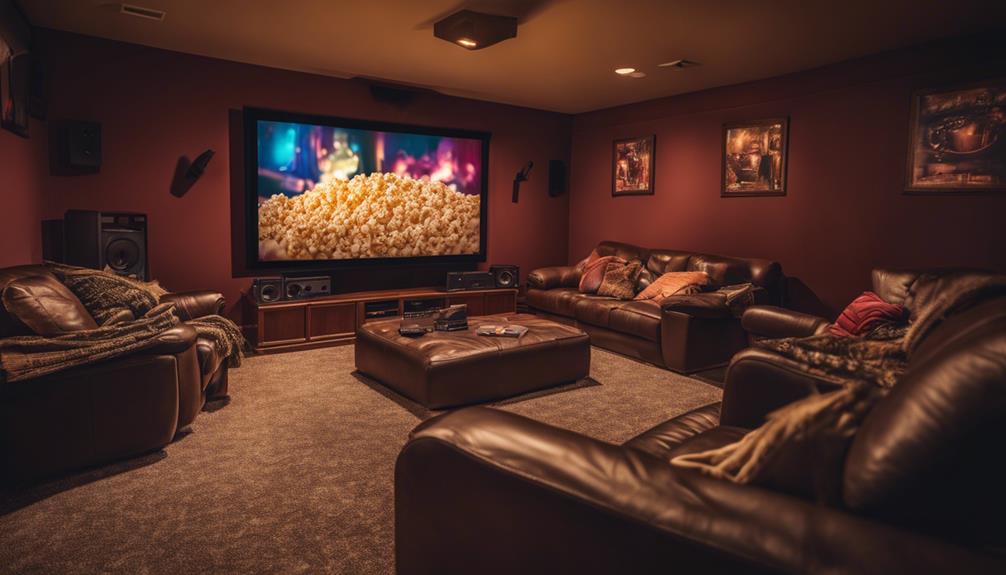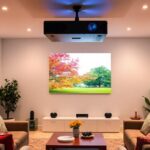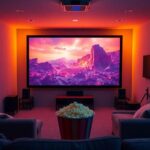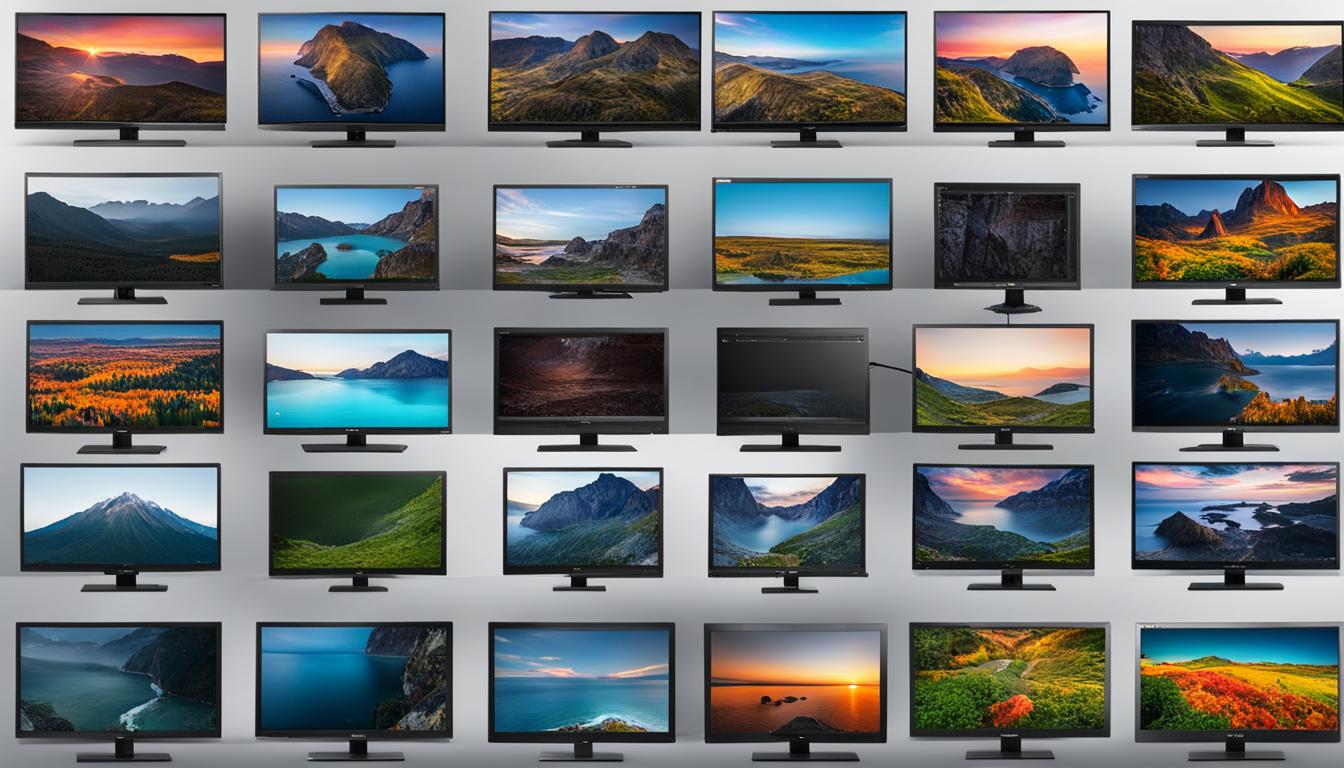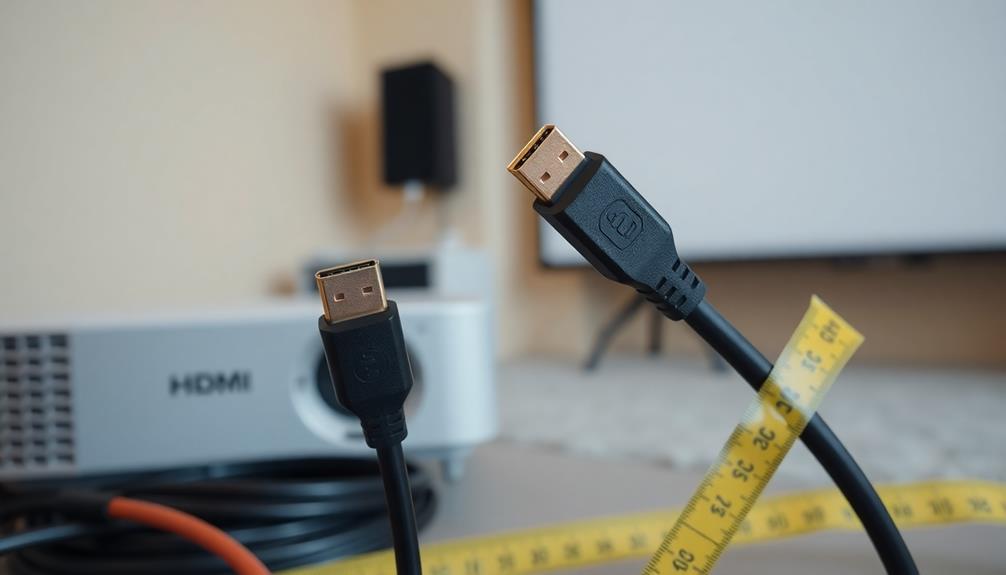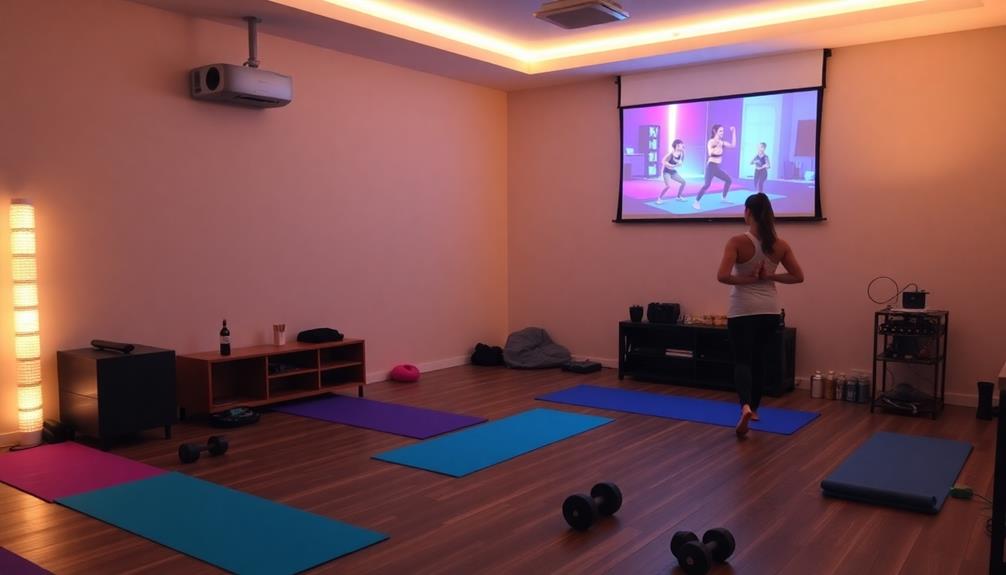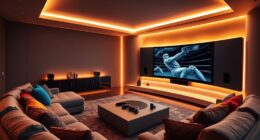To choose the perfect projector for your home theater, start by defining how you'll use it. Are you into movies, gaming, or casual viewing? Next, assess your room's lighting; aim for at least 2,500 lumens for bright spaces. Your budget matters too—good options range from $600 to over $3,000. Don't forget to take into account the projector type, required resolution, and necessary connectivity options. Think about audio, since projectors usually need external systems to deliver great sound. With these factors in mind, you're well on your way to an amazing setup, and there's plenty more to uncover about enhancing your viewing experience.
Key Takeaways
- Determine your primary usage—movies, gaming, or presentations—to select the right projector type and features.
- Assess room conditions, including ambient light, to choose a projector with adequate brightness (2,500+ ANSI lumens for well-lit spaces).
- Set a budget that accommodates the projector, accessories, and potential extra costs for optimal performance.
- Opt for a resolution that suits your screen size, with 4K providing superior clarity for larger displays.
Define Your Usage
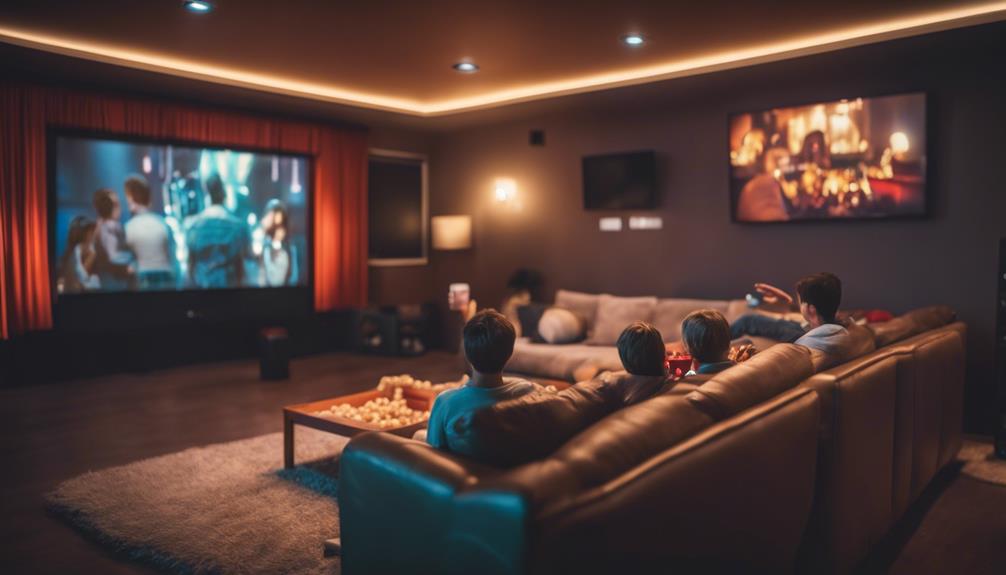
Before you start shopping for a projector, it's important to define your usage, as different models cater to specific needs like movie watching, gaming, or business presentations.
If you're focusing on movies and TV shows, look for projectors that excel in color accuracy and can reproduce the Rec 709 color gamut. These projectors often have dedicated Cinema or Movie modes, making them ideal for your home theater.
Additionally, consider how the sound system configuration (5.1, 7.1) enhances audio immersion to complement your visual setup, which can greatly elevate your viewing experience, especially when paired with a quality headphone amplifier.
For a dedicated theater room, investing in higher-end projectors is worth considering. These models typically offer HD resolution and superior contrast ratios, ensuring you get the best visual experience.
On the other hand, if you're planning to use the projector for casual viewing, a portable mini projector might suffice. However, keep in mind that these often compromise on brightness and color accuracy, which mightn't meet your expectations for a true home theater experience.
Assess Room Conditions
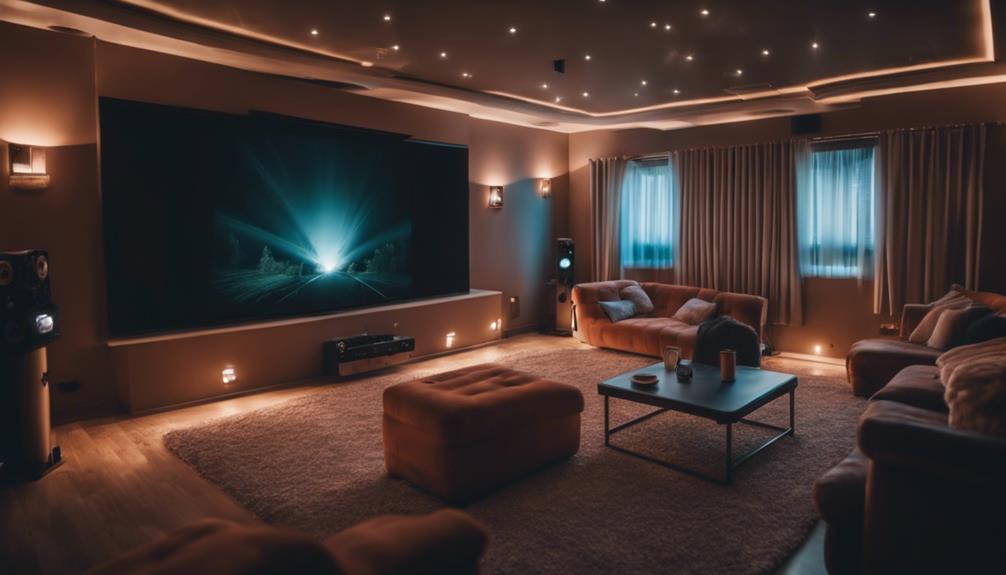
Evaluating your room conditions is essential to guarantee your projector delivers the best possible performance and viewing experience.
Start by examining room conditions, particularly the ambient light. If your space has significant natural light, you'll need a projector with at least 2,500 ANSI lumens to maintain image clarity. For darker rooms, you can opt for lower brightness levels.
Next, consider the size of your room. Larger spaces typically require brighter projectors to provide vibrant images. If you have control over the room lighting, think about using ambient light rejecting (ALR) screens. These screens can help counteract the effects of unwanted light, enhancing contrast and color for your viewing pleasure.
Don't forget to calculate the throw distance, which is the distance between the projector and the screen. This will help you achieve the desired image size.
Determine Your Budget
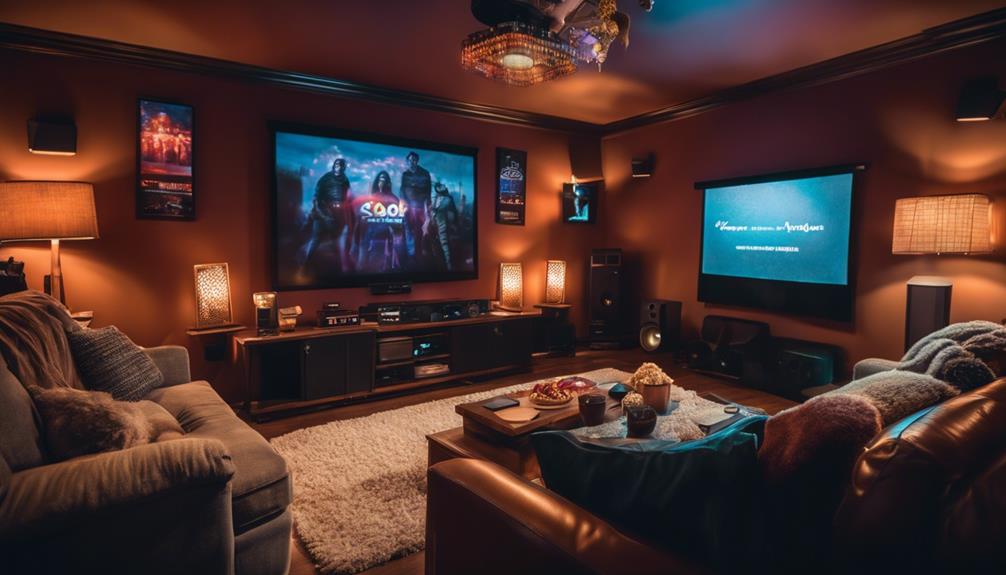
When determining your budget for a home projector, start by setting a spending limit that reflects your needs.
Prioritize essential features that will enhance your viewing experience, and don't forget to factor in additional costs like screens and sound systems.
This way, you'll guarantee you get the most value for your investment.
Set a Spending Limit
Setting a budget is essential for finding the perfect projector that fits both your needs and your wallet. A quality home theater projector usually ranges from $600 to over $3,000, so it's wise to aim for a budget of around $1,500 to $2,000 for an ideal experience.
When setting your budget, remember to allocate funds for essential accessories like projector screens and sound systems, as these can greatly impact the overall quality of the image.
If you're facing a tight budget, prioritize the projector itself and consider more affordable accessories or second-hand options. This way, you can still enjoy a great viewing experience without overspending. Keep an eye out for current sales, as many retailers offer discounts that can make high-quality projectors more accessible.
Also, factor in potential extra costs, such as shipping fees for online orders and long-term maintenance expenses, like bulb replacements. By considering all these factors, you'll have a clearer picture of what you can realistically spend and what'll work best for your home theater setup.
Prioritize Essential Features
It's important to focus on key features that will enhance your viewing experience while staying within your budget. When you're evaluating home theater projectors, prioritize essential components like the projector and screen over premium accessories. A recommended budget range for a quality experience is $1,500 to $2,000, but you can find options starting around $600.
Remember, picture quality is vital, especially in various ambient room settings. Look for projectors with multiple HDMI ports to accommodate your sound system and other devices. Additionally, consider the long-term costs, such as bulb replacements, which can add between $200 and $500 over time.
Here's a simple breakdown to help you prioritize:
| Feature | Importance Level |
|---|---|
| Picture Quality | High |
| Projector & Screen | High |
| HDMI Ports | Medium |
| Sound System | Medium |
| Long-term Costs | Low |
Consider Additional Costs
Determining your budget for a home theater projector means accounting for not just the projector itself, but also essential accessories and maintenance costs.
Projector costs can range from about $600 to over $3,000, with a recommended budget of $1,500 to $2,000 for a quality experience. Don't forget to allocate funds for essential accessories like projector screens and sound systems, which can greatly impact your overall budget.
While you might find budget-friendly projector deals, especially during sales, keep in mind that you may still need to invest in maintenance.
Lamp replacements for lamp-based projectors typically range from $200 to $500, with a lifespan of 2,000 to 5,000 hours. If you're working with a tight budget, prioritize the projector itself rather than splurging on premium accessories.
This way, you can guarantee a satisfactory home theater experience without overspending.
Choose Projector Type
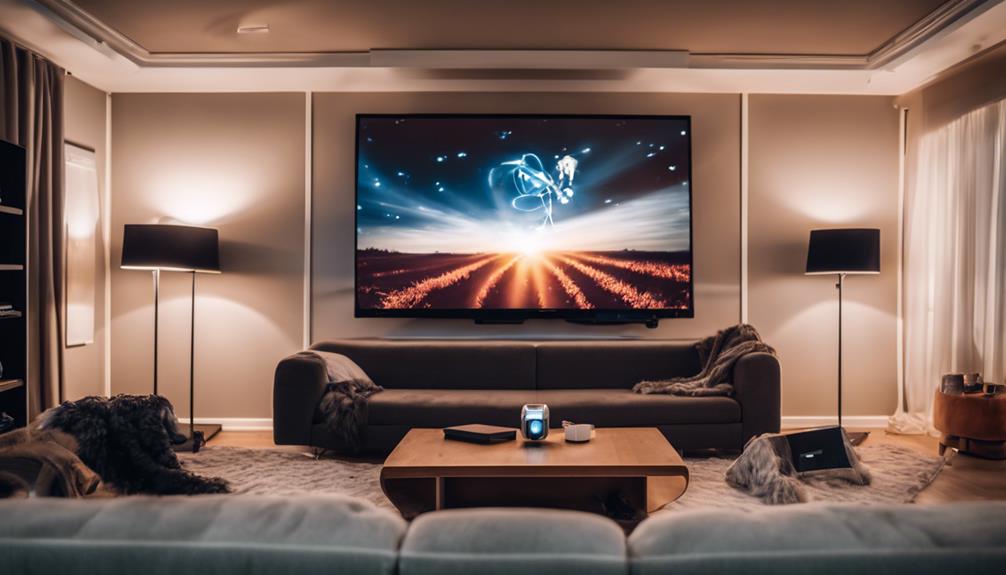
When selecting a projector type, you'll want to contemplate options like DLP projectors, which are popular for their vibrant colors and reliability. These projectors dominate the market, offering excellent image quality and a wide color gamut, particularly if you choose models that support the Rec. 709 standard.
If you're considering a dedicated home theater, investing in higher-end projectors like the Epson LS11000 can greatly enhance your viewing experience in various lighting conditions.
For gaming enthusiasts, look for full-HD or even 4K projectors with a refresh rate of 120 Hz to guarantee smooth visuals and minimal input lag. This can make a big difference in fast-paced games where every millisecond counts.
On the other hand, if you occasionally want a casual viewing experience, portable mini projectors may seem appealing. However, keep in mind they often sacrifice brightness and color accuracy compared to larger models.
Ultimately, the projector type you choose should align with your specific needs, whether that's vibrant colors for cinematic experiences or performance features for gaming.
Evaluate Brightness Needs
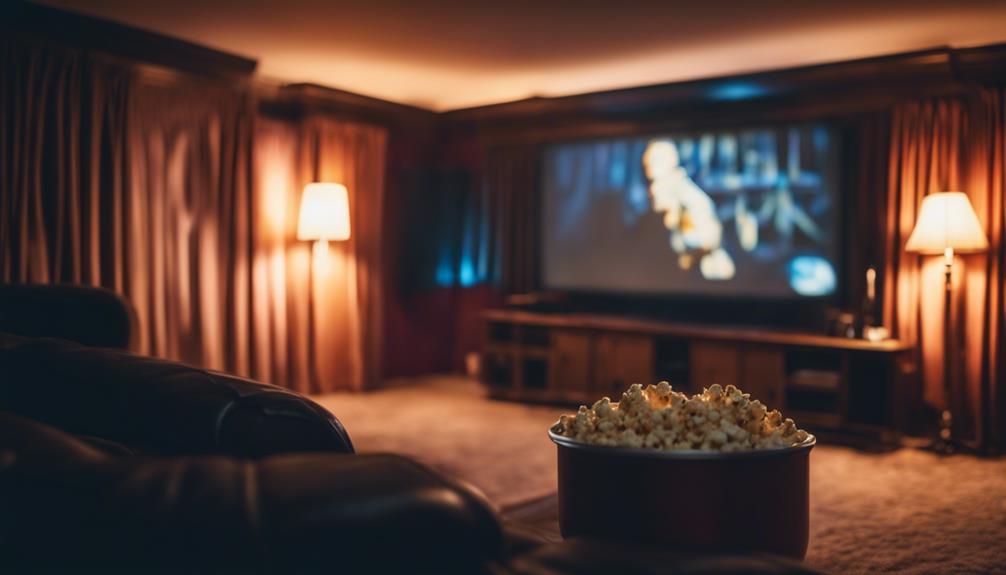
Evaluating your brightness needs is essential for achieving a sharp and vibrant image in your home theater setup. Brightness in projectors is measured in ANSI lumens, and your choice should depend on your room's ambient light.
If you're in a well-lit space, look for projector brightness of at least 2,500 lumens to guarantee clarity and detail. In dedicated home theater environments with controlled lighting, 1,500 to 2,000 lumens might be sufficient, as it enhances color vibrancy without causing glare.
For very bright rooms, consider projectors that exceed 3,000 lumens, which can effectively combat competing light sources. To put this in perspective, a standard 100-watt light bulb emits about 1,600 lumens, helping you gauge your projector needs.
Remember that your screen size also plays a role; larger screens require higher lumens for ideal viewing experiences. By understanding these factors, you can make an informed decision that aligns with your specific home theater requirements and guarantee that your projector delivers the brightest, clearest images possible.
Select Resolution
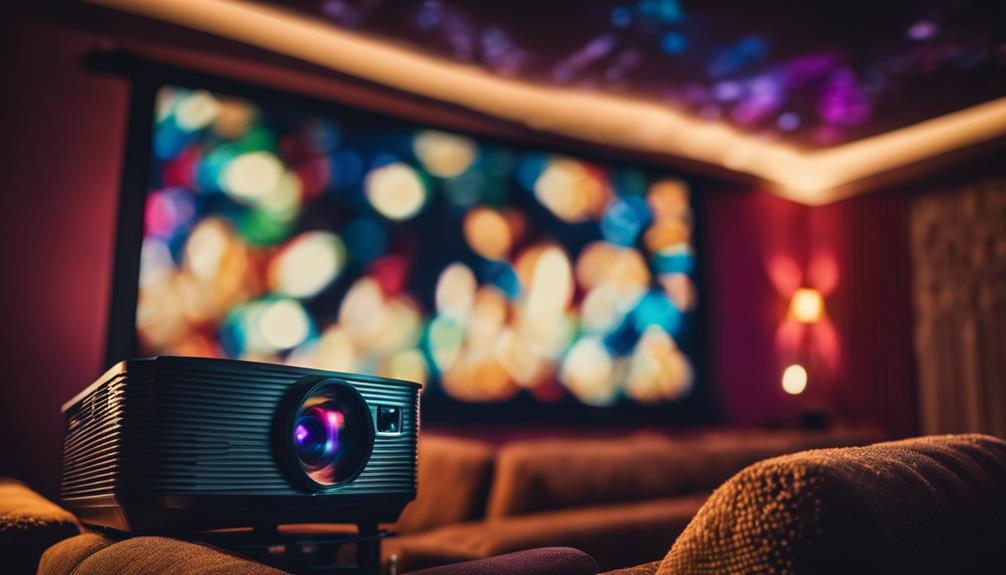
Selecting the right resolution for your projector is essential for achieving stunning image quality and an immersive viewing experience in your home theater. You'll typically choose between Full HD (1920×1080) and 4K UHD (3840×2160) resolutions.
If you're passionate about movies and gaming, a 4K projector might be your best bet, as it delivers over 8 million pixels per frame, offering unmatched clarity and detail. This high resolution is particularly beneficial if you plan on using a larger screen size, as it helps prevent pixelation, ensuring a crisp image, even at close viewing distances.
Additionally, consider the projector's support for High Dynamic Range (HDR). HDR enhances color vibrancy and contrast, further elevating your viewing experience.
While 4K projectors are perfect for a cinematic feel, Full HD models can still provide satisfactory image quality for casual viewing and gaming.
Think about how you'll use your projector, and choose the resolution that best fits your needs. Ultimately, the right resolution will make a significant difference in your home theater setup, transforming how you enjoy your favorite content.
Explore Connectivity Options
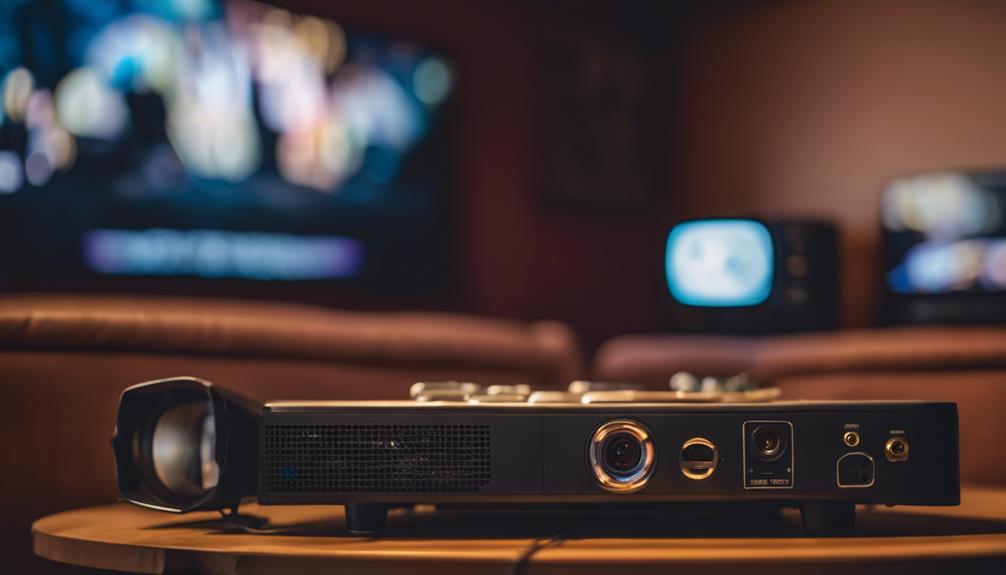
Exploring connectivity options is vital for maximizing the versatility and functionality of your home theater projector. You'll want to guarantee that your projector can accommodate all your favorite devices and media sources.
Here are three key connectivity options to take into account:
- HDMI Ports: Look for a projector with at least one HDMI port, as this is fundamental for connecting streaming devices, Blu-Ray players, and gaming consoles. Some models offer multiple HDMI ports for simultaneous connections and enhanced 4K content compatibility with HDMI 2.0b.
- USB Ports: A USB port can be invaluable for viewing files directly from a flash drive. It also allows for easy software updates and may support wireless casting features, enabling you to connect devices without cables.
- Smart Platforms & Audio Outputs: Many modern projectors come with built-in smart platforms, which require stable Wi-Fi or Ethernet connections for streaming. Also, check for audio outputs like 3.5mm or Bluetooth, making it easier to integrate external sound systems for a richer audio experience.
Consider Audio Integration
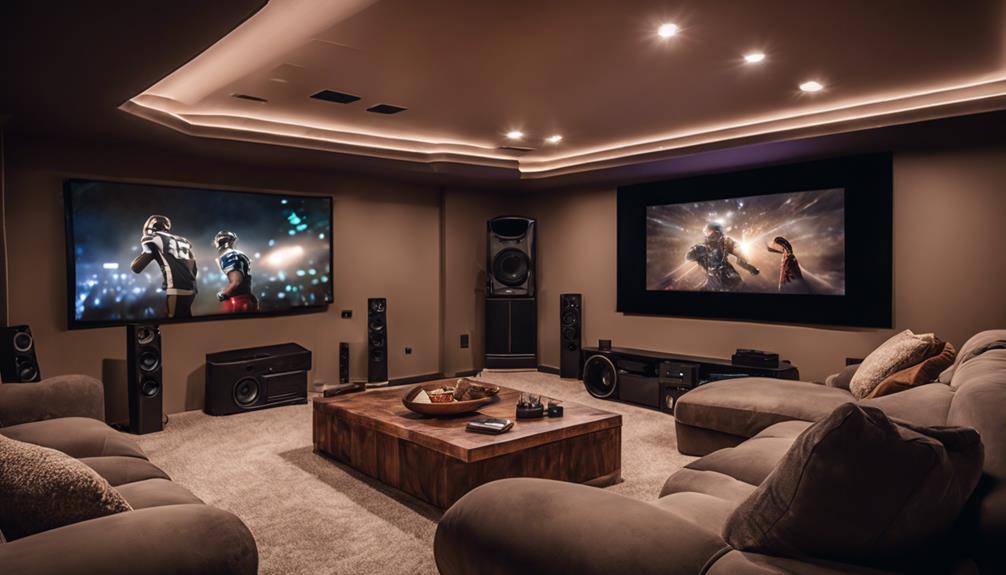
When setting up your home theater, integrating quality audio systems is crucial for elevating your viewing experience. Most projectors don't come with built-in speakers, so you'll need to take into account external sound systems for that immersive audio experience.
A great place to start is with projectors that include Bluetooth functionality, allowing you to wirelessly stream audio to compatible speakers. However, keep in mind that this can sometimes introduce lag during playback.
For a more reliable connection, utilize the 3.5 mm audio output on your projector to connect wired speakers. This guarantees compatibility with various sound systems and provides a clearer sound.
To streamline your audio setup, think about incorporating A/V receivers. They can enhance your sound quality by efficiently routing audio and video signals.
If you're after peak audio performance, look for sound systems that support Dolby Atmos. This technology creates a multi-dimensional sound environment, making your home theater experience truly enchanting.
Frequently Asked Questions
How to Choose a Projector for Home Theatre?
When choosing a projector, you'll want to contemplate brightness, resolution, throw distance, and connectivity. Think about your room's lighting, what you'll watch, and how far you'll sit—those details really matter in your decision.
How Many Lumens Should a Home Theater Projector Have?
For a home theater projector, aim for at least 2,500 lumens in bright rooms. In darker spaces, 1,500 to 2,000 lumens work well. Consider your screen size and viewing distance for ideal brightness.
How Do I Find a Good Quality Projector?
To find a good quality projector, look for at least 2,500 ANSI lumens for brightness, aim for Full HD or 4K resolution, and check contrast ratios and connectivity options. Read reviews to guarantee reliability.
How Do I Choose the Right Size Projector for My Room?
Imagine a cinematic experience blossoming in your living room. To choose the right projector size, measure your space and consider throw distance, brightness, and screen size. That way, you'll create a stunning visual masterpiece.
Conclusion
Choosing the right projector for your home theater is like picking the perfect movie for a cozy night in; it sets the tone for the entire experience.
Imagine settling in with friends, popcorn in hand, as vibrant visuals and crisp sound transport everyone into another world.
By considering your usage, room conditions, and budget, you'll craft an unforgettable cinematic escape right at home.
So, plunge in and make your movie nights magical!
Hello, I’m Art, and I’m excited to be a part of the 1Home Theatre Projector team. As a writer, I’m here to contribute my knowledge and insights to help you achieve the ultimate home cinema experience. I understand that making decisions in the world of home entertainment can be complex, and I’m here to simplify the process for you.
